What 'Extra' Means On TikTok
What does "extra" mean? To be clear, we know that you know what the word means, but in recent years it's taken on a new meaning — particularly with fans of the app TikTok.
It feels like TikTok (and social media as a whole) is helping slang terms spread at a faster rate than ever before, with words like "yeet" and "stan" and of course "extra" taking on new meanings, and it can be tricky for even the most avid TikTok aficionado to keep track.
So, "extra." You've probably seen it used on social media — most likely TikTok — at some point. Whereas we might say something like "Work gave me an extra day off last week" or "There's extra space in the car now, that's not how the word would be used on TikTok. That being the case, what does the word mean on the video-sharing platform? Let's take a closer look.
To be 'extra' is to be dramatic
Per PrepEng, to be "extra" is to be over-the-top, or overly dramatic, and people might be described as being extra. You could directly tell someone that they're being extra — perhaps in an argument — or describe someone as extra to somebody else. You might say "I can't believe she's still mad at me, she's being so extra" or "Chill out, I know you're a stan but you're being so extra this afternoon."
You can kind of see the logic. If someone's being extra they're being more than expected — it definitely seems to make a lot more sense than some of the other TikTok slang you might be hearing. Bustle expands further, describing the slang "extra" as being solely an adjective, and again, one that suggests drama. They use the example of Salt Bae, the Turkish chef who seasons meat with a flourish, as someone who very much can be described as extra, and it's not difficult to see why.
However, "extra" didn't pop up on TikTok out of nowhere. Like much slang, it has origins in African American Vernacular English, or AAVE (per YouTango). As HuffPost's Senior Culture Writer Zeba Blay explained in 2015, "From "the bomb" to "holla" to the very short-lived "YOLO," Black slang words often go through the cycle of being used by Black people, discovered by white people, and then effectively "killed" due to overuse and a general lack of understanding of how to use these words."

